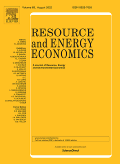
This paper examines the adaptation policy of Small Island Developing States (SIDS) facing climate change. We consider a dynamic economy with the following ingredients: (i) natural capital is an input in local production that is degraded as a result of climate change; (ii) the government has two instruments to cope with climate-related damages: it can adjust the population size thanks to migration policies and/or it can undertake adaptation measures in order to slow the degradation of natural assets; (iii) expatriates send remittances back home. We identify two critical conditions on the fundamentals of the economy that helps understand the features of the optimal policy. We especially show that in most situations, the migration policy is a valuable instrument. Calibrating the model for Caribbean SIDS, we find that the optimal policy of the Caribbean region displays heterogeneity, that is explained by the different degradation rate, population size, and endowment in natural capital. We also highlight that the higher the climate damages, the higher the incentives to conduct an active adaptation policy, combining conventional adaptation actions and migration..
